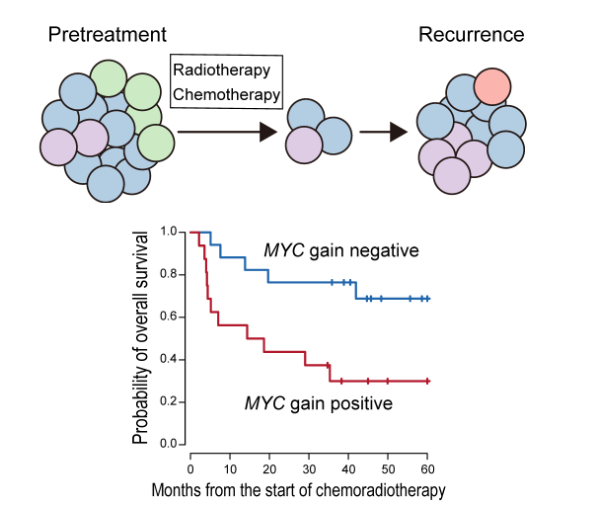Chemoradiotherapy, a treatment in which radiation therapy and anticancer drugs are given at the same time, is effective for esophageal cancer, but post treatment recurrence is a possibility. Although genomic abnormalities in cancers are considered to contribute to treatment resistance, the details of these processes have not been clarified. A research group, consisting of Professor Koshi Mimori, Professor Kousei Ishigami, Associate Professor Masakazu Hirakawa, Dr. Hidenari Hirata (currently National Cancer Center Hospital East), all from Kyushu University; Professor Tatsuhiro Shibata, Professor of Genomic Medical Science, and Professor Atsushi Niida of The Institute of Medical Science, The University of Tokyo; and Tetsuo Akimoto, Deputy Director of the National Cancer Center Hospital East, has revealed the characteristics of the genomic abnormalities in intractable esophageal cancer, which does not respond well to chemoradiotherapy and is prone to recurrence, and the evolution of the cancer genome that leads to it. These findings were published in Cancer Research.
Comprehensive genomic data using next-generation sequencing was acquired from tumors extracted prior to chemoradiotherapy in 33 patients with esophageal cancer. Furthermore, recurrent tumors were extracted from five patients among the cohort. This data was subjected to mathematical statistical analysis using a supercomputer.
Results showed that therapeutic efficacy was lower in esophageal cancers, in which the copy number of the MYC gene, a driver gene that plays a direct role in the growth and survival of cancer cells, is high prior to treatment. In a public cancer cell line database, MYC copy number from esophageal cancers was also correlated with radiotherapy resistance. Furthermore, spatiotemporal analysis of the genomes of recurrent tumors revealed that cancer cells with driver gene abnormalities (such as MYC copy number gain), which play an important role in cancer progression, survive treatment and become a source of recurrence. A small number of driver gene aberrations are newly acquired at the time of recurrence, and thus, treatment influences the evolution of the cancer genome.

Cancer is a disease that originates from a single cell. As the disease progresses, genetic diversity increases, resulting in generating a heterogeneous cell population. Such cancer genomic evolution is thought to be involved in therapeutic resistance. Even once cancer is decreased after treatment, cells with driver gene alterations survive, proliferate again, and eventually recur. Among driver gene alterations, MYC copy number gain was associated with poor survival after CRT in patients with esophageal cancer.
Credit: Kyushu University
These results are expected to advance the understanding of treatment resistance, leading to the development of personalized and precise medical treatments, where chemoradiotherapy can be tailored to the specific genomic information of the cancer to be treated, including the treatment for intractable esophageal cancer. "For many cancers, including esophageal cancer, the cause of recurrence after chemoradiotherapy is not well understood. Now, a part of the mechanism has been clarified. Cancer cells stubbornly continue to evolve while adapting to the harsh environment of treatment, and any surviving cells can cause recurrence. We hope that this research will help patients overcome intractable cancer," said Professor Mimori.
This article has been translated by JST with permission from The Science News Ltd.(https://sci-news.co.jp/). Unauthorized reproduction of the article and photographs is prohibited.




